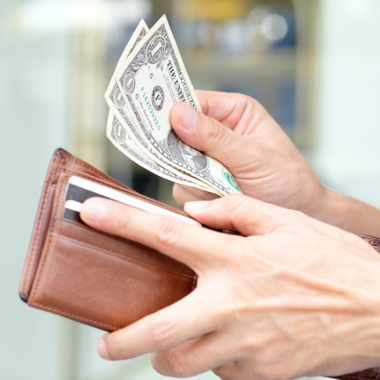Why should U.S. property managers think about accepting digital cash?
Jun 08, 2021Recently on the Paysafecash Blog* we commented that before the global pandemic, 82% of rental payments in the U.S. were paid via a check or in cash. And COVID-19 has created many crises, but not being able to pay rent on an apartment or house has become an essential issue for many Americans for more than a year. In this article we ask Jan Marc Kuelper, VP for Strategic Development of eCash in the U.S., why eCash payment solutions could alleviate these housing issues resulting from the pandemic to some extent, not only for renters willing to pay in cash but also for property managers collecting rent payments.

Jan Marc, in one of your recent articles on the Paysafecash Blog you make the following statement: “COVID-19 has been the catalyst of rapid digital transformation for businesses and consumers. Many aspects of people’s everyday lives were already moving online before the pandemic, but this shift has rapidly accelerated this trend.” How does this apply to the rental industry?
Jan Marc Kuelper: It applies to the industry very much. But the shift from offline to online payments for rentals has been a slower process than in other industries generally since pre-COVID-19, and is being slowed further now because many U.S. citizens are experiencing tremendous issues with paying their rent at all. The gig economy is blossoming during COVID-19 and for the many more employees who now rely on irregular salaries or salaries paid out in cash, digitization of services is not as easy as it should be. Ensuring that those cash-reliant groups of U.S. society are included in the digital financial systems of the future grows in importance every day.
What does financial inclusion mean for property managers?
Jan Marc Kuelper: Firstly, it needs to be said that COVID-19 and the social movements of 2020 have made it obvious that diversity and inclusion not only cannot be neglected anymore; they must be supported anywhere and everywhere. Global social movements such as #blacklivesmatter and growing awareness of what it means to be an inclusive workplace are two clear examples of this movement in action.
Financial inclusion belongs in this discussion.
 | Jan Marc Kuelper VP, Strategic Business Development | In times of accelerating digitization of financial services, including all customer groups and not only those who already are digitally savvy is a critical necessity for all businesses. |
We can see this in eCommerce checkouts: in 2019 20% of all cart abandonments were caused by customers not being able to pay via their preferred payment methods. This easily translates into other industries such as property management because we all are customers whenever we are completing a transaction such as paying rent. If property managers do not offer diverse payment solutions, the consequences are clear; renters might not pay their rent on time.
Or pay their rent at all.
Correct. Again: the global pandemic will not destroy the entire American renting system but it has definitely hit property managers and renters who struggle with regular payments for their rents or mortgages. Issues with paying for rents is not a new phenomenon but it certainly escalated. The governmental help in the form of e.g. stimulus checks makes it clear: many Americans, once they have received money, have paid their rent upfront to avoid evictions i.e. as soon as they can pay they do because nobody wants to become homeless.
As soon as renters have money to pay their rent, what prevents them from doing it on time?
It plays a role in which form the state aid reaches those society groups who are in need. Low-income groups often are un(der)banked and wait for money in cash, sometimes facing delays as we saw last year. Those with jobs, might have to wait for their salaries to be paid in cash. If so their ability to use different payment methods other than cash to pay for everyday expenses such as groceries, utilities, or rent are limited. They cannot do this digitally.
Because of this they are automatically excluded from paying their rent in general if the property manager wants to maximise the benefits of accepting payments digitally – even if practically they could do this with the help of cash. By responding to the renters’ need and offering cash payment options in the rental checkout, property managers with digital property management platforms help renters avoid eviction, can pay their own expenses connected with the property maintenance, and support financial inclusion. Furthermore, collecting money in this way is by far less expensive and less risky for the property manager.
What does cash as a payment option mean for property managers in the long run?
Jan Marc Kuelper: Many Americans are suffering now and will continue to suffer in the future due to the long-term impact the global pandemic has had on their financial situation. At the beginning of this year 18 % of renters in the United States stopped paying their rent because they simply couldn’t afford to during the huge national spike in unemployment. Especially lower income adults are struggling to make ends meet: 46% have difficulties to pay their bills in general, 32% pointed at rental payments explicitly. Without regular payments from renters, property managers will not be able to pay their regular mortgage rates either and will fall into trouble as well. It should be in their common interest to become more flexible in the payment area and make it possible to pay with different means, including cash.
Why does cash still play a relevant role in the American society, especially when it comes to renting?
Jan Marc Kuelper: Numbers speak for themselves: according to recent FDIC reports 22% of U.S. households are still un(der)banked. To make that clearer: roughly 63 million U.S. citizens – a demographic of people almost equal to the whole population of France, still do not have full access to banking and digital payments. Many renters might have access to funds to cover their monthly rent but for some reason they do not have a debit or credit card. Some of them cannot afford to pay regular bank fees, others simply do not wish to disclose their financial data online because of fear of financial identity theft. In 2019 32% Americans were worried about an online theft of their credit card data, 14% of loan and lease, and 7% of bank fraud. Including cash into digital payment systems for rentals, seems to be a logical response to renters’ needs.
* www.paysafecash.com/en/business/blog/cash-is-key-to-the-future-of-the-us-renting-market/



